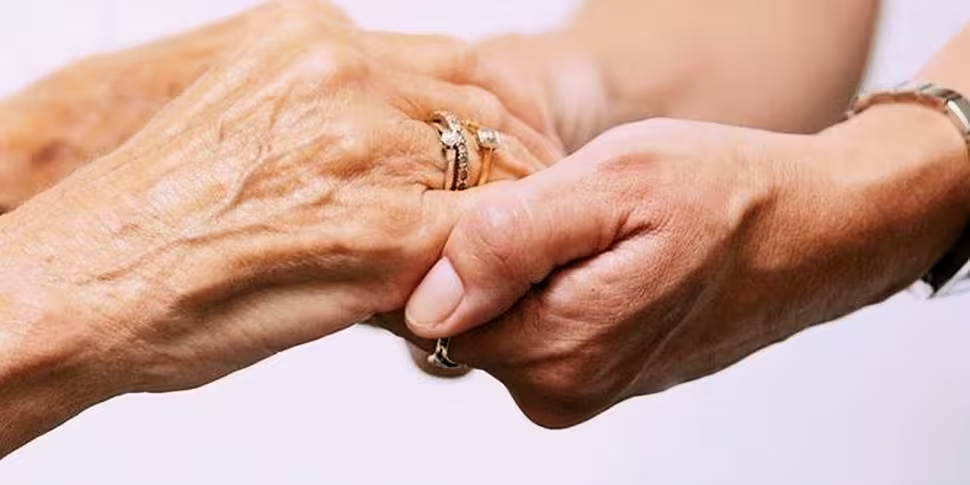This Sunday 24th of September, to mark World Alzheimers Month, we broadcast Producer Emma Cawley's moving documentary: The Cafe.
Originally broadcast in 2016, The Cafe records a day in the life at The Alzheimer Cafe at St Finbarr’s Hospital in Cork
On the last Friday of every month a group of people come together in a small room at St Finbarr’s Hospital in Cork. It’s a rare occasion for these people to sit down, relax over a cup of tea, share some stories, have a laugh or unburden themselves - in a brief respite from day to day life. People young and old are sitting at tables covered in checkered cloths and set with china, chatting, drinking tea. But what brings them all together might not be immediately obvious...
Dementia and Alzheimer’s are a growing issue with today’s global ageing population. Around 48,000 people in Ireland are affected by various types of dementia, however this figure is expected to jump to 68,000 by 2021 and to 132,000 by 2041.
The nature of Alzheimer's means that sometimes it’s difficult for those affected and carers to be in social situations. As a result, caregivers often feel imprisoned at home and unwilling or unable to bring their loved ones out with them. The goal of the cafe is to provide a place for people to socialize with others who understand the challenges they’re facing.
In order to meet that need, the idea of the Alzheimer Cafe was developed in the Netherlands in 1997, and since then cafes have spread throughout the world.
Cafes are designed to be a safe and relaxed place where people with dementia, their families and health and social care professionals can come together to talk, share and learn.
St Finbarr’s Alzheimer Cafe in Cork provides a place to do all of these things, and where the focus is on living well and dealing positively with memory loss.
‘The Cafe’ charts a day in the life of St Finbarr’s Alzheimer Cafe. Visitors to the cafe - those directly affected and carers - honestly share their experiences of memory loss. Staff at the hospital provide insight into the nature of memory loss, and also discuss the Irish research being done in the area of Alzheimer’s and dementia. ‘The Cafe’ is testament to the dedication and love that endures in the face of one of life’s most challenging diseases.
BROADCAST TIMES: 'The Cafe' will be broadcast on Newstalk 106-108fm on Sunday 24th September at 8am
‘The Cafe’ was originally broadcast on Newstalk in February 2016.
LISTEN LIVE ONLINE: ‘The Cafe’ can also be listened to online at: www.newstalk.com.
PODCAST: Podcast available here.
CREDITS: ‘The Cafe’ was produced by Emma Cawley with additional sound by Neil Kavanagh. ‘The Cafe’ was funded by the Broadcasting Authority of Ireland with the television licence fee.
QUOTES FROM THE CAFE:
WILLIE MOLLOY, Geriatrician and professor of medicine at UCC, director and chairman of the centre for Gerontology and Rehabilitation UCC. - "When I first started working in Alzheimer’s people didn’t know what it was. Now people get it. I mean the number are staggering. We’re going to go from forty thousand to one hundred and twenty thousand by 2050 and the whole demographic is shifting. If you look at the twentieth century, the story of the twentieth century was the doubling of the life expectancy. In 1900 it was 47, by the end of the century it was 80. So people actually lived 40 years longer. I mean, that’s incredible. And we’re still living longer. So as the population ages the numbers explode. I remember when I was working at Finbarr’s here as an intern/.../Somebody said hey, there’s an 80 year old on the ward! Wow, she’s 80, look at her! Eighty year olds are driving to the clinic now. They’re going dancing, you know? It’s nothing to be a ninety year old. We’ve got people who are 100 driving. So that shift that’s occurred, even in my life span is incredible, and the length that people are living longer. Sometimes we think that’s a bad thing, sometimes we think that’s a great drain on society, it’s a great drain on healthcare. But it’s a huge boon to society. When you start complaining about people living into their eighties. We’re all going to be there. And how do we protect the services for those people. That’s what it’s all about…









